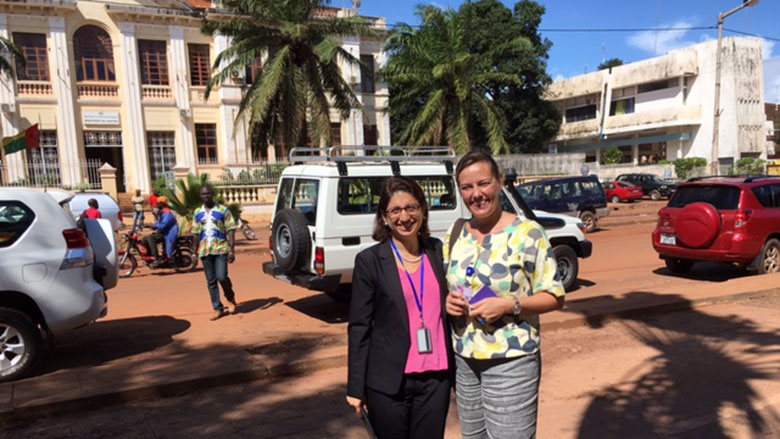In March 2015, the World Bank reengaged with Guinea-Bissau after several years of political instability and a military coup in 2012. At a donor conference in Brussels that same year, the World Bank committed support to help the country boost energy generation, water supply networks, agricultural productivity, private sector growth, sustainable fisheries, and community driven development.
Recently appointed as World Bank Resident Representative to Guinea-Bissau, Kristina Svensson, who previously worked as a senior mining specialist for West Africa and Central and Latin America, discussed the opportunities and challenges to Guinea-Bissau’s development in a short interview.
What do see as the most pressing development challenges for Guinea-Bissau?
KS: I think it is important that Guinea-Bissau diversifies the economy away from cashews, which currently represent 85% of export earnings, and ensures that those farmers that do produce cashews benefit more from the harvest. There is potential to develop other agricultural crops, such as rice and horticulture, extractive industries, and tourism. Strengthening public financial management is also critical to ensuring that revenues are used to improve basic service delivery for the people of Guinea-Bissau, particularly in the health and education sectors which are underserved, and especially for rural populations and women. Guinea Bissau has the second highest infant mortality in the world, and one of the highest rates of female genital mutilation (FGM) in the world.
Energy is another sector that needs to be addressed, as the country is completely dependent on diesel fuel and generators. Today, if you live outside of Bissau, you do not have access to electricity. It is essential to find other alternative energy generation methods that are sustainable and less costly over the long term. Guinea-Bissau could significantly benefit from strengthening energy transmission and distribution throughout the country.
The biggest challenge in my opinion will be overcoming fragility and political instability, and for the World Bank to work effectively despite these conditions. There has been three governments since the 2014 elections and another one shortly to come. Thinking among policy makers is often short-sighted and thus makes it difficult to conduct substantial and much needed reform. The World Bank is looking into working with alternative actors, such as non-governmental organizations (NGOs) and the private sector to deliver basic services.
Guinea-Bissau is one of the world’s poorest countries, and yet it is rich in natural resources such as fisheries, highly prized cashews, bauxite, phosphates, and biodiversity which has a high tourism potential. How can the country use these assets to grow its economy in a sustainable and inclusive manner, allowing Bissau-Guineans to enjoy improved standards of living?
KS: I absolutely believe the Guinea-Bissau has great economic potential and will be able to capitalize on it. The World Bank is playing a key role in supporting the country to advance its development goals, and improve social and economic indicators. We have already supported the country to create the first vessel monitoring system, which is a satellite surveillance system for fishing boats, and have supported the country in drafting modern legislation for fisheries and mining as well as strengthening the cadaster and licensing systems for both sectors. Rent seeking and elite capture is prevalent in Guinea-Bissau, so in order to support increased investment in these sectors, there has to be a clear commitment and progress towards improving governance, transparency, and accountability in these sectors.
Coming from a mining specialist background, I am aware of both the opportunities and risks that exist with developing extractive industries, in particular in countries with very weak capacity to manage and supervise the sector. I believe that the Bank has an important role to play to support the country in minimizing negative environmental and social impacts, and we are currently supporting the government in the analysis of the environmental impact assessment for the first potential large scale mine in the country. We have a role in promoting transparency and accountability in the collection, planning, and use of the revenues, as well as on how to leverage EI to create human capital and linkages with the local economy.
In the past, you have been a focal point for citizen engagement and civil society support under the Extractive Industries Global Programmatic Multi-Donor Trust Fund. How can the World Bank help strengthen civil society engagement in Guinea-Bissau in order promote good governance?
KS: Yes, working with civil society in delivering and monitoring health and education programs will be key going forward. I am also trying to encourage teams to strengthen citizen engagement mechanisms in other sectors such as energy and transport. There are many lessons on how to do this in Guinea-Bissau from the community driven development project, through participatory planning and budgeting to build roads and schools in rural communities, and piloting a cash-transfer program. I believe that the only way that these feedback mechanisms are going to work is through constructive engagement with the government. In the case of Guinea-Bissau, the capacity or willingness of the government to support this kind of feedback is very limited as is that of civil society, so this makes citizen engagement very challenging but all that much more important. There are groups of civil society organizations focusing on extractive industries and forestry issues – so I am looking forward to engaging with them.

